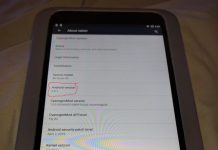 Gizmodo has a great article by Matt Buchanan laying out the “Tower of E-Babel” problem: different readers have their own different, restricted file format ecosystems. There is not a lot new to long-time TeleRead readers, but it would be great to show anyone just getting into e-books, or thinking about it.
Gizmodo has a great article by Matt Buchanan laying out the “Tower of E-Babel” problem: different readers have their own different, restricted file format ecosystems. There is not a lot new to long-time TeleRead readers, but it would be great to show anyone just getting into e-books, or thinking about it.
The article starts with a Steve Jobs quote about Apple using the EPUB format because of its “openness,” and proceeds to fill in what he is not saying: “open” or not, DRM-locked iBooks books will not be readable on other DRM’d EPUB capable readers, nor vice versa.
And don’t expect that DRM to be going away any time soon:
You may be thinking that it’s just a matter of time before ebook stores all go DRM free. That would be wishful thinking at best. While ebooks might seem a lot like digital music circa 2005, you can’t rip a book, so the only way to get a bestseller on your reader is to buy it legally, or to steal it. It’s pretty much that simple. There will be free books, there will be unencrypted books, and the torrents will rage with bestsellers (as they already do). Still, DRM’s gonna be a hard fact of life with every major bookstore, since they’re going to at leasttry to keep you from stealing it. You don’t see Hollywood giving up DRM, do you?
It also explains why every device except the Kindle reads EPUB, and the way the Kindle’s Mobipocket-based formats and Barnes & Noble’s eReader-based format hark back to PDA legacy formats.
I found it particularly interesting that the article complained about the chance of getting an eReader-format book when you want an EPUB-format one, given that we carried a story about someone in exactly the opposite situation.
The article concludes with the suggestion that creating custom apps to contain books might be the way to go. (I’m not entirely sure whether it’s talking about appbooks, or just individual apps from specific publishers.)
One amusing note: at the end, the article suggests that scanned-comic piracy will “explode” when the iPad comes out, now that a good screen will exist for reading those colored pages.
I suspect that Buchanan probably has not checked out the Internet comic piracy scene lately, given that it is possible to find just about any comic you want on BitTorrent already. But just wait—as soon as the iPad comes out, I’ll bet you that even though the amount of it does not change much, everybody will be Macaulay Culkin-faceslapping in horror how much of a Problem it suddenly is.
I don’t agree with everything the article has to say, but it makes a good primer on the “Tower of E-Babel” problem. Worth a look.

































“You can’t rip a book” is, of course, flat-out wrong. Not only can you, people have been doing so for at least ten years, and it’s still the dominant source of books on file-sharing networks, not DRM-stripped commercial releases. Then again, it’s a Gizmodo article, so expecting technical nous is probably futile.
I love the quoted part in the article… especially “You can’t rip a book”
Thing is, if one has lots of time on your hands, you can type it.
If your lazy, you can scan it.
Oh, and you can do this with library books, so you don’t have to pay for it either.
Not that I’m advocating this in any way, just pointing out that DRM is stupid AND pointless.
Just to be contrary, I’ll point out that while it is indeed possible to ‘rip’ a book, it takes a huge amount of time and effort compared to ‘ripping’ a CD; you’ve got to scan it page by page (and if you’re not careful, break the spine while you’re doing so), OCR it, proof the OCR, and finally convert it to your e-reader format of choice. There’s no comparison whatsoever to how easy it is to grab a song off a CD, or even a movie off a DVD.
So yeah, while you can nitpick about truth-in-technology, in practical terms, they’re absolutely right – scanning a book is so much work that very few people are going to do it, and almost no one in the ‘general public’ audience that they’re talking about. In real-world usage, they’re correct – the choice for the average reader will be between buying a legit copy and stealing a bootleg copy. Scanning will never enter into it. (In fact, even at minimum wage, the time-cost of scanning a book will be more the price of a legitimate copy; I’ve never had a personal scanning project take less than 3-4 hours, or $21-28 @ minimum wage rates.)